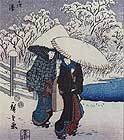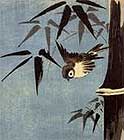

Tales
of Old Japan
by Algernon Bertram Freeman-Mitford
The Loves of Gompachi and Komurasaki
A
Story of the Otokodate of Yedo
The Wonderful Adventures of Funakoshi Jiuyemon
The Eta Maiden and the Hatamoto
The
Accomplished and Lucky Tea-Kettle
The Crackling Mountain
The Story of the Old Man Who Made Withered Trees to Blossom
The Battle of the Ape and the Crab
The Adventures of Little Peachling
The Elves and the Envious Neighbour
How Tajima Shume Was Tormented By a Devil of His Own Creation
Concerning Certain Superstitions
How a Man Was Bewitched and Had His Head Shaved By the Foxes
The Crackling Mountain
Once upon a time there lived an old man and an old woman, who kept a pet white hare, by which they set great store. One day, a badger, that lived hard by, came and ate up the food which had been put out for the hare; so the old man, flying into a great rage, seized the badger, and, tying the beast up to a tree, went off to the mountain to cut wood, while the old woman stopped at home and ground the wheat for the evening porridge. Then the badger, with tears in his eyes, said to the old woman—
"Please, dame, please untie this rope!"
The dame, thinking that it was a cruel thing to see a poor beast in pain, undid the rope; but the ungrateful brute was no sooner loose, than he cried out—
"I'll be revenged for this," and was off in a trice.
When the hare heard this, he went off to the mountain to warn the old man; and whilst the hare was away on this errand, the badger came back, and killed the dame. Then the beast, having assumed the old woman's form, made her dead body into broth, and waited for the old man to come home from the mountain. When he returned, tired and hungry, the pretended old woman said—
"Come, come; I've made such a nice broth of the badger you hung up. Sit down, and make a good supper of it."
With these words she set out the broth, and the old man made a hearty meal, licking his lips over it, and praising the savoury mess. But as soon as he had finished eating, the badger, reassuming its natural shape, cried out—
"Nasty old man! you've eaten your own wife. Look at her bones, lying in the kitchen sink!" and, laughing contemptuously, the badger ran away, and disappeared.
Then the old man, horrified at what he had done, set up a great lamentation; and whilst he was bewailing his fate, the hare came home, and, seeing how matters stood, determined to avenge the death of his mistress. So he went back to the mountain, and, falling in with the badger, who was carrying a faggot of sticks on his back, he struck a light and set fire to the sticks, without letting the badger see him. When the badger heard the crackling noise of the faggot burning on his back, he called out—
"Holloa! what is that noise?"
"Oh!" answered the hare, "this is called the Crackling Mountain. There's always this noise here."
And as the fire gathered strength, and went pop! pop! pop! the badger said again—
"Oh dear! what can this noise be?"
"This is called the 'Pop! Pop! Mountain,'" answered the hare.
All at once the fire began to singe the badger's back, so that he fled, howling with pain, and jumped into a river hard by. But, although the water put out the fire, his back was burnt as black as a cinder. The hare, seeing an opportunity for torturing the badger to his heart's content, made a poultice of cayenne pepper, which he carried to the badger's house, and, pretending to condole with him, and to have a sovereign remedy for burns, he applied his hot plaister to his enemy's sore back. Oh! how it smarted and pained! and how the badger yelled and cried!
When, at last, the badger got well again, he went to the hare's house, thinking to reproach him for having caused him so much pain. When he got there, he found that the hare had built himself a boat.
"What have you built that boat for, Mr. Hare?" said the badger. "I'm going to the capital of the moon,"52 answered the hare; "won't you come with me?"
"I had enough of your company on the Crackling Mountain, where you played me such tricks. I'd rather make a boat for myself," replied the badger, who immediately began building himself a boat of clay.
The hare, seeing this, laughed in his sleeve; and so the two launched their boats upon the river. The waves came plashing against the two boats; but the hare's boat was built of wood, while that of the badger was made of clay, and, as they rowed down the river, the clay boat began to crumble away; then the hare, seizing his paddle, and brandishing it in the air, struck savagely at the badger's boat, until he had smashed it to pieces, and killed his enemy.
When the old man heard that his wife's death had been avenged, he was glad in his heart, and more than ever petted and loved the hare, whose brave deeds had caused him to welcome the returning spring.
The text came from:
Freeman-Mitford,
A. B. Tales of Old Japan. London: Macmillan, 1871, 1890.
Amazon.com:
Buy the book in paperback.
FOOTNOTES
Footnote 52:The mountains in the moon are supposed to resemble a hare in shape. Hence there is a fanciful connection between the hare and the moon.
Return to place in text.
©Heidi
Anne Heiner, SurLaLune Fairy Tales
E-mail: surlalune@aol.com
Page last updated June 1, 2005
www.surlalunefairytales.com







